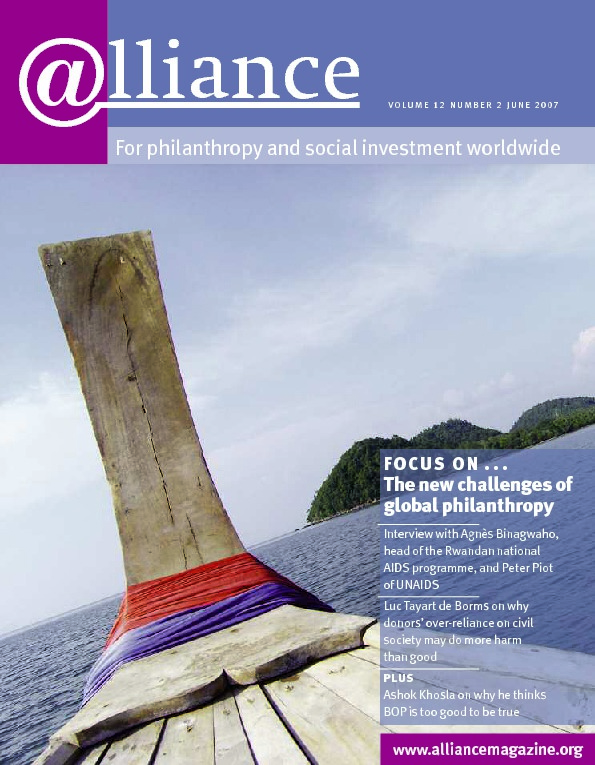For many UK foundations, funding work in developing countries presents a dilemma. On the one hand, the potential benefits are great: the needs are huge and grants that are modest by UK standards can make a significant impact. On the other hand, funding internationally can involve moving into unfamiliar territory and may appear difficult at the operational level.
Larger foundations, or those that concentrate a substantial proportion of their funds on development, may be able to justify the necessary investment in infrastructure to support their programmes, but those who fund on a smaller scale usually can’t.
Three foundations, the Baring Foundation, the Nuffield Foundation and the Paul Hamlyn Foundation, which have all developed funding models to deal with this dilemma, commissioned a study, Going Global – a review of international development funding by UK trusts and foundations, to look specifically at funders whose international funding, like their own, is less than £1 million per annum, regardless of the overall scale of the foundation’s funding. This article looks both at their overseas work and at the results of the study.
The funding models
Of the three commissioning foundations, the Baring Foundation and the Nuffield Foundation fund international work that is carried out by overseas organizations in partnership with UK organizations, while the Paul Hamlyn Foundation has an in-country adviser to support its funding of Indian community-based organizations directly.
The Baring Foundation’s focus for its international grantmaking is problems arising from migration in Sub-Saharan Africa. It invests its overseas budget (£500,000 out of a grantmaking budget of £3 million) in capacity-building. The grant goes to a UK-registered international NGO partnered with an NGO/CBO in Sub-Saharan Africa. Added to this amount, the Ellerman Foundation also contributes £250,000 to Baring’s overseas grantmaking budget. Grants tend to be large – up to £250,000 for as much as five years.
As an example, Baring funded a project from 2001 to 2004 in South Sudan which supported 20 women’s groups in rural communities that had been set up by women returning to their villages from refugee camps as the fighting subsided; the majority were widows or had been separated from their husbands by the war. The £239,850 project helped to train more than 800 women in the basics of running an organization. As a result, 11 village centres were set up where women could meet one another and gain access to information. The women were also trained in practical skills (particularly in ploughing, crop cultivation, livestock management and small business development). This improved their ability to produce food for their families; members increased their income and were able to pay school fees for their children.
The Nuffield Foundation funds UK NGOs or universities, working in partnership with African organizations, to improve service provision in health, education and civil justice. Every other year it gives four grants (up to £250,000 each from an annual grantmaking budget of £8 million) to train practitioners. A recent grant supported the development of research and practice in biomedical sciences in Tanzania. University College London and the health services faculty of Tuimaini University established a diploma and a BSc in Laboratory Health Sciences; increased research capacity helped Tuimaini secure a major grant from the European Developing Country Clinical Trials Partnership.
For the last eight years, the Paul Hamlyn Foundation has employed a consultant in India, who now works half-time for the Foundation; more recently there have been two additional consultants each working one day a week. The focus of grantmaking is ‘enabling very disadvantaged and marginalized groups gain access to basic services’. They typically fund 20-25 organizations at any one time, with grants ranging from £5,000 to £100,000 over three years. For many, but not all, organizations the Foundation operates what it calls a ‘nursery strategy’. This means that it starts organizations off with a one-year grant of around £5,000 (which has considerable purchasing power in India) and decides whether to continue funding depending on how the organization develops over the first year. If successful, it is likely to receive a three-year grant, and sometimes another three after that.
The Paul Hamlyn Foundation’s international grantmaking budget for last year was £550,000, which was about 5 per cent of its overall grantmaking for that year.
Motivations
The motives for the overseas involvement of the foundations studied often turned out to be historical – and this is true of the three commissioning foundations. The Nuffield Foundation’s support for capacity-building in Commonwealth countries stems from activities initiated during Lord Nuffield’s lifetime to build capacity in higher education in the then Empire. Now the Foundation supplements funding from another trust that it administers – the Commonwealth Relations Trust – whose deed stipulates that funding must be used to support links with Commonwealth countries.
In the case of the Paul Hamlyn Foundation, Paul Hamlyn visited the country for business and personal travel over a number of years, and made a few private donations. As the frequency of his visits and his interest in, and concern for, disadvantaged people there grew, the arrangements were put on a professional footing and the donations began to be made by his charitable foundations.
The Baring Foundation started life as a corporate foundation established by a bank that derived part of its work/income from middle-income countries, particularly in Latin America (where the programme did initially operate). Another reason given by David Cutler, the foundation director, is the huge impact you can have on the lives of your target group.
The aims of the study
The foundations’ aims in commissioning Going Global were twofold. First, by learning more about the context in which foundations work and about the methods that are being used, they hoped to improve their own international grants programmes and to gather information that would be helpful to others who fund on a similar scale. Second, by describing the models used by those funding on a small to medium scale, they hoped that others would be encouraged to consider making grants for work in developing countries, either on their own or through partnerships.
The findings of the research, carried out by New Philanthropy Capital, show that While supporting international development is not always straightforward for a small-scale funder, the foundations featured in this report do so routinely and with success. Many foundations have been successful by operating in ways that are not very different from their normal procedures. The Nuffield Foundation’s Commonwealth Programme, for instance, uses the same grantmaking process as it does in many of its other programmes, with an expert committee to advise the Trustees and external reviewers to provide independent views on proposals.
A niche for the flexible funder
The report shows that independent foundations can fill a niche that is different from that of larger mainstream funders, and highly valued for that reason. Strategic changes in government funding can adversely affect the work of small and medium-sized NGOs and foundations are able to meet some of these needs; grant-seekers view foundations as flexible funders – more able to respond rapidly to changing needs, more willing to support unpopular or marginal issues, more open to trying out new approaches or projects. Above all, the benefits of funding international development projects can be huge. While the outcomes of funding are not the main focus of the report, the few examples that are included illustrate the impact that funding of various sizes, carefully targeted, can achieve.
Beyond this study …
During the course of the research, the researchers and the steering committee became aware of a general interest in non-governmental support for international development beyond the scope of the study both in Europe and in the US. Government aid agencies have also begun to explore collaboration with foundations. At the same time, the role of the newer foundations in funding international work and the increase in the number of organizations and individuals exploring new ways of doing philanthropy are changing the context in which smaller funders operate. The study found that most of the foundations that fund on a large scale are relatively newly formed, perhaps reflecting an increased awareness of development issues. The commissioning group is interested in exploring these possible connections and developments in the future.
As the project developed, it became increasingly clear that the second aim of the study – encouraging smaller funders into the international development field – would be a long-term effort. Foundations do not decide lightly to enter a new field and the reasons behind their decisions can be complex. The commissioning foundations are open to approaches from those who are interested in initiating funding in this area, or who would like to investigate collaborative ways of funding international work. There will also be opportunities for further discussion though the Association of Charitable Foundations’ international network.
Sarah Lock is Commonwealth Programme Co-ordinator at the Nuffield Foundation. She was a member of the steering committee for the Going Global research. Email slock@nuffieldfoundation.org
For more information
http://www.nuffieldfoundation.org
http://www.baringfoundation.org.uk
http://www.phf.org.uk
To order the report
Going Global – a review of international development funding by UK trusts and foundations is published on 6 June. It is available free of charge, in hard copy and on the web, from New Philanthropy Capital. Go to http://www.philanthropycapital.org






Comments (0)